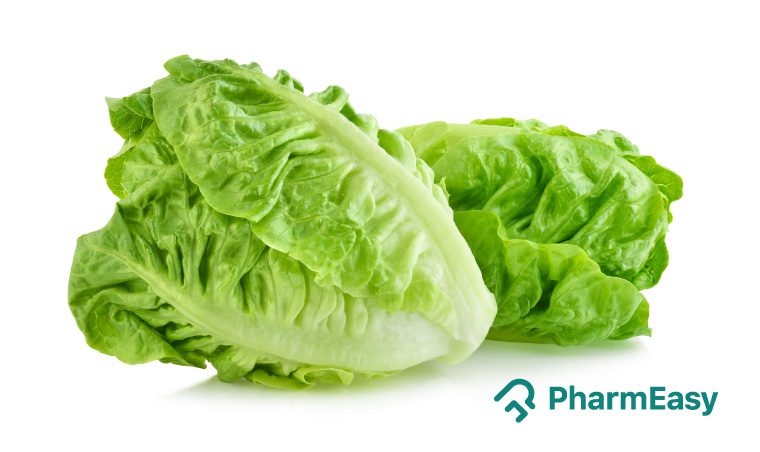Lettuce (Salad Patta): Uses, Benefits, Side Effects By Dr. Rajeev Singh
By Dr Rajeev Singh +2 more

Get,

to manage your symptom
Get your,


4 Cr+ families
benefitted

OTP sent to 9988776655



You’ve successfully subscribed to receive
doctor-approved tips on
Whatsapp

Get ready to feel your best.

Hi There,
Download the PharmEasy App now!!


Register to Avail the Offer
Send OTPBy continuing, you agree with our Privacy Policy and Terms and Conditions

Hi There,
Sign up on PharmEasy now!!
Trusted by 4 crore+ families

OTP sent to 9988776655



You have unlocked 25% off on medicines




Code: NU25
By Dr Rajeev Singh +2 more
Table of Contents
You noticed lettuce in your favourite food items like sandwiches, burgers, and salads which gives additional crunchiness. Lettuce has many health benefits and can be included in our regular diet. The scientific name of lettuce is Lactuca sativa and consumed worldwide. China is the largest producer of lettuce, and the most consumed countries are the USA and Western Europe.

The lettuce comes in different sizes and shapes and is available throughout the year. Lettuce is a rich source of fibre, iron, vitamin C and folate while it has less sodium, calories and fat1. The low calorie and rich source of vitamins and fibre make lettuce special. The following sections contain more information regarding the potential uses and nutritional facts of lettuce.
Did you know?
Macronutrients:
Vitamins:
Minerals:
Nutritional value of lettuce per 100g of serving3
Lettuce for kidney associated symptoms! Researchers believe that lettuce might be helpful in reducing kidney-associated symptoms such as pruritis (skin irritation). Lettuce has an anti-inflammatory nature6.
Dr. Siddharth Gupta, B.A.M.S, M.D (Ayu)
The properties of lettuce are given below.
Lettuce may help you slow down the ageing process! Lettuce may offer a natural anti-ageing treatment, according to researchers. Antioxidants are thought to be abundant in lettuce7.
Dr. Rajeev Singh, BAMS

Enzymes like α-amylase and α-glucosidase are responsible for breaking down starch into glucose. This elevates blood glucose levels and regular intake of lettuce may inhibit these enzymes. The presence of these compounds in the lettuce may reduce blood glucose levels. Thus, lettuce might be helpful for diabetic patients4. However, more research is required regarding the effect of lettuce. Moreover, diabetes is a major health issue and requires proper diagnosis. Kindly consult a doctor and do not self-medicate.

Heart diseases are one of the significant risks to public health. Many studies report that consuming green leafy vegetables may help in reducing heart diseases. Lettuce is low in fats, calories and a rich source of fibre and vitamins. Being low in fat and rich in fibre might contribute to low cholesterol levels. Moreover, Vitamin E and Vitamin C present in lettuce might be responsible for the antioxidant potential of lettuce1. These two effects (cholesterol-lowering and antioxidant potential) might reduce the risk factors related to heart diseases. Therefore, lettuce might be helpful against heart disease4. However, if you are suffering from any heart disease, adhere to the doctor’s advice and treatment. Do not self-medicate.

Research showed that daily intake of lettuce might be associated with a reduced risk of lung cancer. A high amount of phenolic compounds are present in lettuce which might be responsible for its anticancer potential. It was seen that lettuce might potentially inhibit the growth and multiplication of cancer cells in the body. In addition, it might also help in initiating the elimination of defective cancer cells from the body through a process called apoptosis (programmed cell death)4. More studies on humans are awaited to support the use of lettuce against human cancer cells. Therefore, you need to consult a doctor before using herbal remedies for cancer.

Lettuce contains more amount of vitamins and phytochemicals4. Vitamin C and phytochemicals present in lettuce might help activate and boost immunity1. However, more studies are required to support the use of lettuce in any immunological conditions. Therefore, if you notice any problems related to the immune system, reach out to your healthcare provider and get a proper diagnosis.

Consuming lettuce may help protect the liver from damage by restoring the levels of liver enzymes and improving liver performance. The antioxidant property of lettuce might be responsible for its liver protective effects. The phenolic compounds present in lettuce have shown good antioxidant potential. The antioxidant may reduce the damage induced by free radicals and may protect the liver4. If you experience liver problems, talk to a healthcare provider before using lettuce as a remedy. Do not self-medicate.

Adding lettuce to a regular diet may protect the brain from damage. The antioxidant and anti-degenerative (preventing degeneration of neurons) properties of lettuce might be due to phenolic compounds present in the lettuce. Consuming lettuce may prevent brain damage caused due to ischemia (low blood oxygen levels). The bioactive components present in lettuce might help against ischemia and reperfusion (restored blood flow) damage caused to the brain by interfering with the expression of neurotrophin-3 and nerve growth factor4. These properties of lettuce have been observed in lab studies and more studies are needed to claim the use of lettuce for brain-related conditions. In case of any brain conditions, talk to a healthcare provider.
Though many studies show the benefits of lettuce in various conditions, these studies are insufficient. Therefore, there is a need for further research to establish the true extent of the benefits of lettuce on human health.
Did you know that lettuce might aid in weak and brittle bones? According to researchers, lettuce might lead to healthy and strong bones since it contains a lot of vitamin K, which retains bone mass7.
Dr. Smita Barode, B.A.M.S, M.S.
Lettuce can be consumed raw, because of which most of its nutrients are conserved. It is popularly used in salads1.
You must consult a qualified healthcare provider before taking lettuce or any herbal ingredients. Do not replace or discontinue an ongoing treatment of modern medicine with an ayurvedic/herbal preparation without consulting a qualified doctor.
Side effects associated with the usage of lettuce are given below.
Before using lettuce for its health benefits, make sure to consult a doctor about the side effects associated with its use. This will help avoid side effects.
These are some precautions you must take while using lettuce.
Before consuming lettuce for its benefits on health, talk to a healthcare provider about the possible side effects associated with its use.
Also Read: Soybean: Uses, Benefits, Side Effects By Dr. Rajeev Singh
There is a lack of sufficient information on the interactions of lettuce with other drugs. Therefore, you are advised to exercise precautions. If you are receiving medical treatment for a particular health condition, talk to your doctor regarding the possible interaction of the treatment with other herbs and drugs. This will help you make well informed choices.
Also Read: Besan: Uses, Benefits, Side Effects By Dr. Rajeev Singh
Lettuce is packed with nutritional and phytochemical components. Therefore, lettuce may show potential uses against diabetes and cancer. In addition, consuming lettuce might positively affect the liver, brain and immunity4. However, if you are suffering from any disease condition, you are advised to consult a doctor before using lettuce for your symptoms.
Lettuce (Salad Patta) leaves are low in calories and contain high fibre and vitamins3. Therefore, you can add lettuce to your diet to manage weight. However, talking to a nutritionist before making significant changes in your diet is essential. By getting professional help, you make better choices for your health.
Consuming lettuce in excess can cause many side effects. These are mydriasis (dilation of the pupil), photophobia (inability to look at bright light), dizziness, heart and breathing difficulty, excessive sweating, hallucinations, and induced sleep4.
Consuming lettuce may help lower blood glucose levels. It might interfere with the activity of enzymes that might cause an increase in blood glucose levels. Thus, this might help and may reduce diabetes4. These effects have been observed in lab trials. However, large-scale human tests are needed to support the use of lettuce against diabetes. Therefore, avoid using lettuce for diabetes before consulting your healthcare provider. Do not self-medicate.
Yes, lettuce can be eaten raw and is popularly used for making salads1.
Disclaimer: The information provided here is for educational/awareness purposes only and is not intended to be a substitute for medical treatment by a healthcare professional and should not be relied upon to diagnose or treat any medical condition. The reader should consult a registered medical practitioner to determine the appropriateness of the information and before consuming any medication. PharmEasy does not provide any guarantee or warranty (express or implied) regarding the accuracy, adequacy, completeness, legality, reliability or usefulness of the information; and disclaims any liability arising thereof.
Links and product recommendations in the information provided here are advertisements of third-party products available on the website. PharmEasy does not make any representation on the accuracy or suitability of such products/services. Advertisements do not influence the editorial decisions or content. The information in this blog is subject to change without notice. The authors and administrators reserve the right to modify, add, or remove content without notification. It is your responsibility to review this disclaimer regularly for any changes.
Comments

Leave your comment...
You may also like
Comments